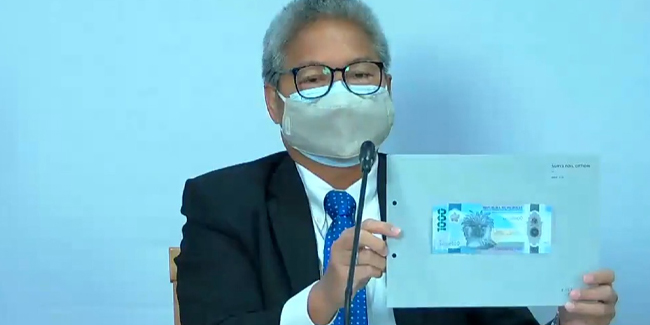New polymer P1,000 banknotes will start circulation in mid-2022, according to BSP.
BSP — On Thursday, the Bangko Sentral ng Pilipinas said that the new polymer P1,000 banknotes will start circulation in mid-2022.

BSP Governor Benjamin Diokno said that the new polymer P1,000 banknotes will start circulation in mid-2022 after the central bank signed a production deal with the Reserve Bank of Australia.
Diokno said in his weekly virtual briefing that the Reserve Bank of Australia’s subsidiary Note Printing Australia was tapped for the production of the new polymer P1,000 banknote.
According to Diokno, Australia was the first country to issue a full series polymer banknotes as it has also produced and supplied the bills for several countries.
“The P1,000 note will begin circulating in mid-2022,” Diokno said. “As the sole issuer of Philippine money, the BSP ensures that our coins and notes serve the need of the Filipino people.“
Diokno also said that shifting to polymer banknotes was more environment-friendly, cost-effective, hygienic, and will increase protection from counterfeits.
READ ALSO: BSP To Start Testing Polymer PHP 1,000 Banknotes In 2022
According to him, crime syndicates had been improving their techniques in counterfeiting the new generation banknotes that were currently in circulation.
“Given the increasing scarcity of water, energy and others, our banknotes should be made to last longer,” Diokno said.
BSP Deputy Governor Mamerto Tangonan, meanwhile, earlier said that the test banknotes will have the same look as the current P1,000 banknote but will carry new security features.
However, the PhilFIDA (Philippine Fiber Industry Development Authority) said that using polymer has “many drawbacks”
The group was also raising the side of the abaca industry. ABS-CBN News reported that current paper banknotes were made up of 20% abaca fiber, with cotton making up the remaining 80%.
But the central bank said that the impact would be minimal and that they’re pushing for the use of abaca paper for land titles, passports, birth certificates, and other civil registry documents.
For more news and updates, you may feel free to visit this site more often. You may also visit Newspapers.ph via our official Facebook page and YouTube channel.
